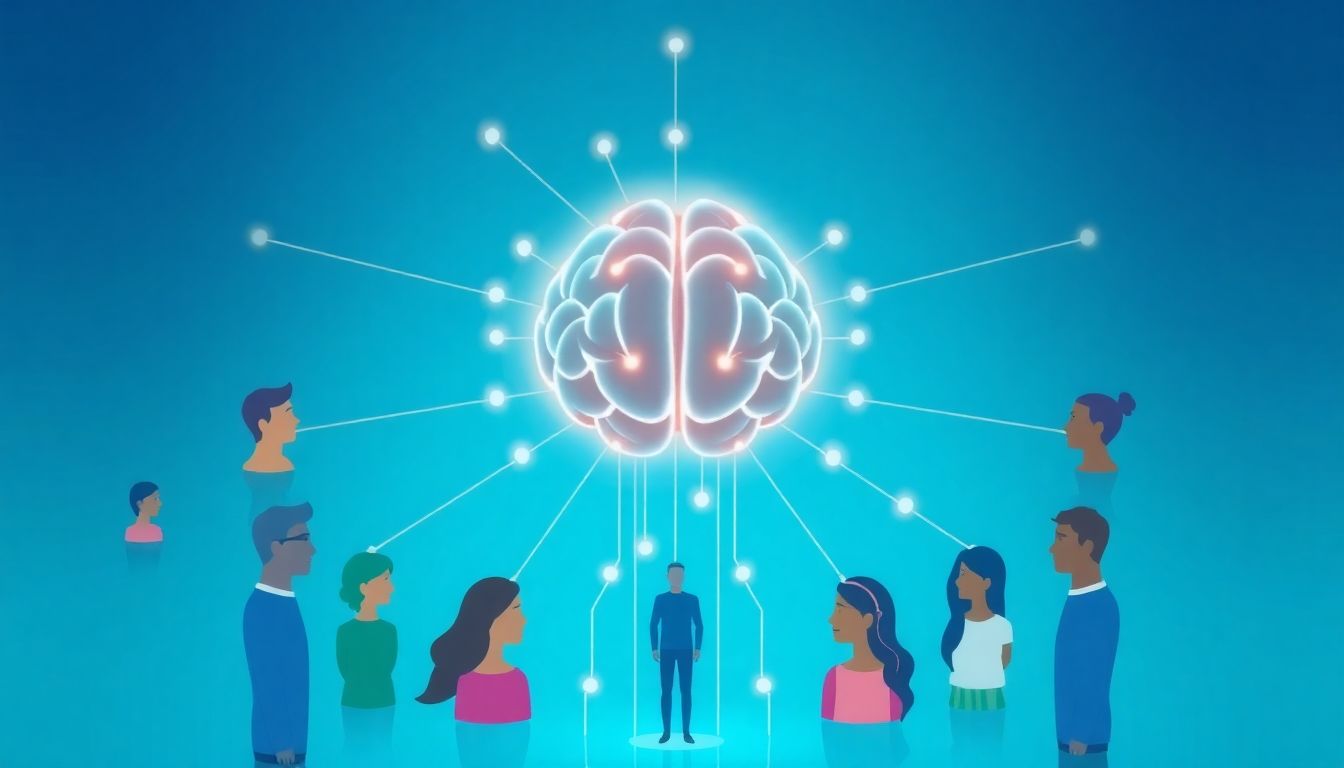Revolutionizing B2C Selling with AI: Why It’s Crucial and How to Implement It
Revolutionize B2C selling with artificial intelligence. Learn crucial implementation strategies for enhanced customer experience.
Selling things to people these days is different. People want things just for them, and they expect quick answers. This is where artificial intelligence comes in. It's not just a fancy word; it's a tool that can really change how businesses talk to customers and sell stuff. We'll look at why using artificial intelligence is a big deal now and how you can start using it to make your sales better.
Key Takeaways
Artificial intelligence helps businesses understand what customers want and makes interactions more personal.
Using artificial intelligence can make customer service faster and give better product suggestions.
Artificial intelligence can find new customers and make the sales process smoother.
Putting artificial intelligence into your business has some problems, like keeping data safe and making sure it works with your old systems.
You need to check how artificial intelligence is doing by looking at sales numbers and other important information to make sure it's worth it.
The Imperative of Artificial Intelligence in B2C

It's not news that the world of business is changing fast. What worked even a few years ago might not cut it today. When it comes to connecting with customers, artificial intelligence is no longer a 'nice-to-have'—it's a must. Companies that don't embrace AI risk falling behind.
Understanding the Modern Consumer Landscape
Consumers today are bombarded with choices and information. They expect instant gratification and personalized experiences. Think about it: we're all used to getting what we want, when we want it. This means businesses need to understand their customers better than ever before. It's not enough to just sell a product; you need to sell an experience. This is where AI comes in, helping to sift through mountains of data to understand what each customer really wants.
The Shift Towards Personalized Engagement
Generic marketing is dead. Customers want to feel seen and understood. AI makes it possible to deliver personalized experiences at scale. Imagine a world where every ad, every email, and every product recommendation is tailored to the individual. That's the power of AI. It's about making each customer feel like they're your only customer. This personalized engagement is what sets businesses apart.
Scaling Customer Interactions with AI
Handling a large volume of customer interactions can be a nightmare. AI-powered chatbots and virtual assistants can handle routine inquiries, freeing up human agents to focus on more complex issues. This not only improves customer satisfaction but also reduces operational costs. It's about doing more with less, and AI is the key.
AI isn't just about automating tasks; it's about creating better experiences for both customers and employees. It's about making business more efficient, more personal, and more profitable. It's the future of B2C, and it's here now.
Leveraging Artificial Intelligence for Enhanced Customer Experience
AI isn't just about making things faster; it's about making them better for the customer. Think about it: a happy customer is way more likely to stick around and recommend you to others. So, how can AI help make customers happier?
Personalized Product Recommendations
Remember the last time you got a recommendation that was totally off? Annoying, right? AI can fix that. By analyzing customer data, AI algorithms can suggest products that a customer is actually likely to want. This goes beyond just suggesting similar items; it's about understanding individual preferences and needs. It's like having a personal shopper who knows you better than you know yourself!
Streamlined Customer Support with AI Agents
Tired of waiting on hold for hours? AI-powered chatbots and virtual assistants are changing the game. These AI agents can handle a lot of common questions and issues instantly, freeing up human agents to deal with more complex problems. This means faster response times and happier customers. Plus, AI agents can work 24/7, so customers can get help whenever they need it.
Predictive Analytics for Customer Needs
Imagine knowing what your customers need before they even know it themselves. That's the power of predictive analytics. AI can analyze past behavior, purchase history, and other data to anticipate future needs. This allows businesses to proactively offer solutions, creating a sense of being truly understood and valued. It's not just about selling; it's about building relationships.
AI is changing the way businesses interact with customers. It's not just about automation; it's about creating more personalized, efficient, and satisfying experiences. By using AI to understand customer needs and provide tailored solutions, businesses can build stronger relationships and drive loyalty.
Implementing Artificial Intelligence in Your Sales Funnel
Okay, so you're thinking about actually using AI in your sales process? Good. It's not just hype; it can seriously change things. Let's break down how to get AI working for you, step by step.
AI-Powered Lead Generation and Qualification
Forget cold calling from a list you bought in 1998. AI can find leads that are actually interested in what you're selling. AI algorithms can analyze tons of data – social media activity, website visits, content engagement – to identify potential customers who show buying signals. It's like having a super-powered research assistant who never sleeps. Plus, AI can score these leads based on their likelihood to convert, so your sales team focuses on the hottest prospects. Think of it as a digital assistant that helps you find the right people at the right time. For example, AI can transform browsers into loyal customers by identifying those who are most likely to convert based on their online behavior.
Optimizing Sales Processes with Intelligent Automation
Sales is often bogged down in repetitive tasks. Scheduling meetings, sending follow-up emails, updating CRM records – it all eats into selling time. AI can automate a lot of this stuff. Imagine:
AI-powered chatbots handling initial inquiries and qualifying leads 24/7.
Automated email sequences that adapt based on prospect engagement.
Smart CRM systems that predict when a lead is ready for a sales call.
By automating these tasks, your sales team can spend more time building relationships and closing deals. It's about making them more efficient, not replacing them. Think of AI as a tool to augment their abilities.
Post-Purchase Engagement and Retention
Selling doesn't stop when the deal closes. Keeping customers happy is just as important, and AI can help with that too. AI can analyze customer data to identify potential churn risks and trigger proactive interventions. For example:
Personalized onboarding experiences based on customer needs.
AI-driven customer service that resolves issues quickly and efficiently.
Targeted content and offers that keep customers engaged and coming back for more.
AI can also help you understand what your customers really think. Sentiment analysis can be used to monitor social media and customer feedback, giving you insights into areas where you can improve. It's all about building long-term relationships and turning customers into advocates.
Overcoming Challenges in AI Adoption for B2C
Okay, so you're thinking about bringing AI into your B2C sales strategy. Awesome! But let's be real, it's not all sunshine and rainbows. There are definitely some hurdles to jump over. It's like deciding to learn guitar – the idea is cool, but then you realize you have to actually practice and your fingers hurt. Same deal here. Let's talk about some of the big ones.
Data Privacy and Security Considerations
First up: data. Everyone is talking about data privacy these days, and for good reason. You can't just grab customer data and use it however you want. People are sensitive about their information, and regulations like GDPR and CCPA are there to protect them. You need to be super careful about how you collect, store, and use customer data for your AI initiatives. Think about things like anonymization, encryption, and getting clear consent. Messing this up can lead to serious legal trouble and a damaged reputation. It's like leaving your front door wide open – you're just asking for problems.
Integrating AI with Existing Systems
Next, getting AI to play nice with your current systems can be a real headache. You've probably already got a CRM, an email marketing platform, and maybe even some legacy systems that are held together with duct tape and prayers. Trying to shoehorn AI into that mix can be tricky. You might need to invest in new infrastructure, APIs, or even completely overhaul some of your existing systems. It's like trying to fit a square peg in a round hole – you can force it, but it's not going to be pretty.
Cultivating an AI-Ready Organizational Culture
Finally, and this is a big one, you need to get your team on board. AI isn't just a technology thing; it's a people thing. If your employees are resistant to change or don't understand how AI can help them, your efforts are going to fall flat. You need to invest in training, communication, and change management to create a culture that embraces AI. It's like trying to bake a cake without a recipe – you might get something edible, but it's probably not going to be great.
It's important to remember that AI adoption is a journey, not a destination. There will be bumps in the road, but by addressing these challenges head-on, you can increase your chances of success and unlock the full potential of AI for your B2C sales efforts.
Measuring the Impact of Artificial Intelligence on B2C Sales

Alright, so you've jumped on the AI bandwagon, which is great! But how do you actually know if it's working? It's not enough to just throw some AI tools into your sales process and hope for the best. You need to track the right things and see if you're getting a real return. Let's break down how to measure the impact of AI on your B2C sales.
Key Performance Indicators for AI Success
KPIs are your friends here. You need to pick the ones that make sense for your business and the specific AI tools you're using. Don't just measure everything; focus on what matters. Here are a few ideas to get you started:
Conversion Rates: Are more leads turning into customers? This is a big one. If your AI-powered lead qualification is working, you should see a bump.
Customer Lifetime Value (CLTV): Is AI helping you keep customers around longer and get them to spend more? Look at how AI-driven personalization affects repeat purchases.
Customer Satisfaction (CSAT) Scores: Are customers happier with their experience? AI-powered support should be making things smoother.
Sales Cycle Length: Is AI speeding up the time it takes to close a deal? Automation can really help here.
Analyzing Return on Investment
Okay, so you're tracking KPIs. Now, let's talk money. You need to figure out if the AI is actually paying for itself. This means looking at the costs of implementing and running the AI versus the gains you're seeing in sales and efficiency. It's not always a straightforward calculation, but it's important to get a handle on it.
Here's a simple way to think about it:
ROI = ((Gain from Investment - Cost of Investment) / Cost of Investment) * 100For example, if you spent $10,000 on an AI tool and it helped you generate an extra $25,000 in profit, your ROI would be 150%. Not bad!
Continuous Improvement Through AI Insights
AI isn't a set-it-and-forget-it thing. You need to keep an eye on how it's performing and make adjustments as needed. This is where the insights from your AI tools come in handy. Look for patterns and trends in the data. Are certain AI-powered recommendations working better than others? Are there areas where the AI is underperforming? Use these insights to tweak your strategies and make the AI even more effective.
Think of AI as a learning machine (because, well, it is). The more data you feed it and the more you refine its algorithms, the better it will get at helping you sell. It's an ongoing process of testing, learning, and optimizing.
Here's a quick table to illustrate the point:
The Future of B2C Selling with Advanced Artificial Intelligence
The B2C landscape is on the cusp of a massive shift, driven by the relentless advancement of AI. We're not just talking about chatbots anymore; the future involves AI that anticipates needs, personalizes experiences at an unprecedented scale, and operates with a level of autonomy that redefines customer engagement. It's a bit like science fiction becoming reality, but with a focus on making things better for both businesses and consumers. It's going to be interesting to see how it all unfolds.
Proactive Customer Service with AI
Imagine a world where customer service anticipates your needs before you even voice them. That's the promise of proactive AI. AI can analyze customer data to predict potential issues or needs, offering solutions before frustration sets in. Think about it: an AI detecting a potential shipping delay and automatically offering a discount or alternative solution. It's about moving from reactive problem-solving to preemptive care, building trust and loyalty in the process.
Hyper-Personalization at Scale
Personalization is already a buzzword, but hyper-personalization takes it to a whole new level. AI algorithms can analyze vast amounts of data to create individualized experiences for each customer. This goes beyond just recommending products based on past purchases. It's about tailoring the entire customer journey, from the initial marketing message to post-purchase support, to resonate with individual preferences and behaviors. It's like having a personal concierge for every customer, but powered by AI.
Ethical Considerations in AI-Driven Sales
As AI becomes more integrated into B2C sales, ethical considerations become paramount. It's not just about what AI can do, but what it should do. Data privacy, algorithmic transparency, and the potential for bias are all critical concerns. We need to ensure that AI is used responsibly, fairly, and in a way that respects customer autonomy. It's a complex challenge, but one that's essential for building a sustainable and trustworthy AI-driven future. The future of marketing strategy hinges on ethical AI implementation.
It's important to remember that AI is a tool, and like any tool, it can be used for good or ill. The key is to develop clear ethical guidelines and regulations to ensure that AI is used in a way that benefits both businesses and consumers. This includes being transparent about how AI is being used, giving customers control over their data, and ensuring that algorithms are fair and unbiased.
Conclusion
So, we've talked a lot about AI and selling to customers. It's pretty clear that using AI isn't just a nice idea anymore; it's becoming a must-have for businesses that want to do well. If you start using AI now, you can get ahead of the game. It helps you understand your customers better, makes things run smoother, and can even help you sell more stuff. Don't wait around, because the businesses that use AI are going to be the ones that really shine.
Frequently Asked Questions
How does AI make B2C selling better?
AI helps businesses understand what customers want, offer personalized suggestions, and handle customer questions quickly. It makes shopping easier and more fun for everyone.
Can AI really guess what I want to buy?
AI looks at what customers have bought before and what they've looked at to suggest other things they might like. This makes shopping feel special for each person.
Will AI take over customer service jobs?
Yes, AI can power chatbots that answer common questions right away. For harder problems, it can send you to a real person who can help.
How does AI help businesses find new customers?
AI helps find people who are most likely to buy, making sure sales teams talk to the right customers. It also helps automate small tasks so salespeople can focus on bigger things.
What are the tough parts about using AI in sales?
Some challenges include keeping customer information safe, making sure AI systems work with older business tools, and teaching employees how to use AI effectively.
How do companies know if AI is actually helping their sales?
Businesses check things like how many sales go up, how happy customers are, and how much money they save because of AI. This helps them see if AI is worth the investment.








